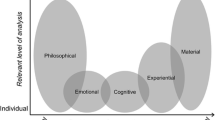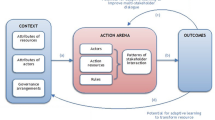Abstract
Land use planning and policy making for environmental systems involve uncertainty, long time scales, and complex socio-natural systems and processes; most decisions are often characterized by conflict and tension and give rise to disagreements which are widely considered and managed as disagreement about socio-environmental values. Although the growing acceptance of participatory models in environmental planning and policy making is forcing the public authorities to implement participatory mechanisms, participation practices are not showing much effectiveness in reducing conflict and tension. This paper argues that negotiation approaches in participatory decision making often pose the attention on disputing actors and their related values (in the field of environmental planning, on socio-environmental values) thus amplifying the risk for conflict to sharpen. Participation practices, in fact, often use Decision and Conflict Analysis models as means to disclose structures of parties’ values and preferences to parties themselves, thus risking to enhance sources for conflict and tension. In this article, participation is conceptualized as an exploration process looking for decision ‘opportunities’ which allow transforming participatory decision making into operational collaboration. To illustrate the discussion we present a case of participatory decision making process in the Torre Guaceto wetland, a Natural Reserve in Southern Italy. The process refers to the formulation of the land use plan and is analysed by the application of a cognitive model. The analysis shows how the negotiation process evolves from a conflict to collaboration and becomes centred on the content of the decision rather than the social and environmental values involved.
Similar content being viewed by others
References
Amin A, Roberts J (2008) Knowing in action: beyond communities of practice. Res Policy 37: 353–369
Barbanente A, Borri D, Pace F (1994) Microproblemi e Microdecisioni nella Pianificazione con Ragionatori Artificiali. In: Maciocco G (eds) La Città, la Mente, il Piano. Franco Angeli, Milano, pp 207–229
Bellantuono N, Pontrandolfo P, Scozzi B (2006) Knowledge networks within supply chain to foster innovation. In: Proceedings of the 14th international working seminar on production economics, 20–24 February, Innsbruck
Borri D, Celino A, Concilio G (2005) Open content system: prospettive nella pianificazione ambientale. In: Cecchini A, Plaisant A (eds) Analisi e Modelli per la Pianificazione. Teoria e Pratica: lo Stato dell’Arte. FrancoAngeli, Milano, pp 41–52
Callahan K (2007) Citizen participation: models and methods. Int J Public Adm 30(11): 1179–1196
Celino A, Concilio G (2008) Can an ‘Observatory in action’ approach help in rethinking planning practices? In: Proceedings of the fourth joint congress ACSP-AESOP 2008, 6–11 July, Chicago
Concilio G (2000) Le valutazioni multicriteri. Strumenti per l’Apprendimento nei Processi Decisionali. Urbanistica 113: 137–143
Cundill G, Fabricius C (2009) Monitoring in adaptive co-management: toward a learning based approach. J Environ Manage 90: 3205–3211
De Bernardi A (2008) Immobilismo decisionale o innovazione politica? La linea ferroviaria Torino-Lione e la Valsusa. Territorio 46: 41–48
Fisher F, Forester J (1993) The argumentative turn in policy analysis and planning. UCL Press, London
Forester J (2009) Dealing with differences: dramas of mediating public disputes. Oxford University Press, Oxford
Funtowicz SO, Ravetz JR (1993) Science for post-normal age. Futures 25: 739–755
Healey P (1996) The communicative turn in planning theory and its implications for spatial strategy formations. Environ Plann B Plann Des 23(2): 217–234
Kangas J, Store R (2003) Internet and teledemocracy in participatory planning of natural resources management. Landsc Urban Plan 62: 89–101
Kersten G (1997) Support for group decisions and negotiations: an overview. In: Climaco J (eds) Multicriteria analysis. Springer, Heilderberg, pp 332–346
Konisky D, Beierle T (2001) Innovations in public participation and environmental decision making: examples from the great lakes region. Soc Nat Resour 14(9): 815–826
Mostert E (2003) The challenge for public participation. Water Policy 5: 179–197
Pahl-Wostl C (2007) The implications of complexity for integrated resources management. Environ Model Softw 22: 561–569
Pellizoni L (2003) Uncertainty and participatory democracy. Environ Values 12: 195–224
Spector BI (1993) Decision analysis for practical negotiation application. Theory Decis 34: 183–199
Susskind L, Field P (1996) Dealing with an angry public. The mutual gains approach to resolving public disputes. Free Press, New York
Tress B, Tress G (2003) Scenario visualisation for participatory landscape planning—A study from Denmark. Landsc Urban Plan 64: 161–178
van den Hove S (2006) Between consensus and compromise: acknowledging the begotiation dimension in participatory approaches. Land Use Policy 23: 10–17
Weingart LR, Tepper DA, Prietula MJ (2005) An exploration-exploitation model of negotiation. Working Paper, Tepper School of Business, Carnegie Mellon University. http://gbspapers.library.emory.edu/archive/00000135. Accessed 3 July, 2009
Zeleny M (1989) Editorial. Cognitive equilibrium: a new paradigm of decision making. Human Syst Manage 8: 185–188
Zeleny M (1998) Multiple criteria decision making: eight concepts of optimality. Human Syst Manage 17: 97–107
Zeleny M (2009) On the essential multidimensionality of an economic problem. AUCO Czech Econ Rev 2: 154–175
Author information
Authors and Affiliations
Corresponding author
Additional information
The present article is the result of a collaborative work between the authors; their names are listed alphabetically.
Rights and permissions
About this article
Cite this article
Celino, A., Concilio, G. Explorative Nature of Negotiation in Participatory Decision Making for Sustainability. Group Decis Negot 20, 255–270 (2011). https://doi.org/10.1007/s10726-010-9197-3
Published:
Issue Date:
DOI: https://doi.org/10.1007/s10726-010-9197-3




